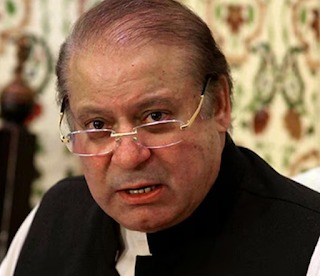Former Prime Minister of Pakistan, Nawaz Sharif, has expressed a hopeful outlook regarding the possibility of improved relations between India and Pakistan following the visit of Indian External Affairs Minister S. Jaishankar to Islamabad for the Shanghai Cooperation Organization (SCO) meeting on October 16. Sharif believes that Jaishankar’s visit could serve as a significant turning point, allowing both nations to transcend their historical grievances and focus on pressing global issues such as energy security and climate change, which have increasingly become matters of urgency for countries around the world.
In an exclusive interview with *India Today*, Sharif underscored the critical need for resuming the peace dialogue between India and Pakistan. He emphasized that both countries should not allow the peace process to falter any further, particularly given the lengthy history of conflict and unresolved tensions that have characterized their relationship for decades. He stated, “We should pick up the threads from where we left,” invoking a sense of continuity and a desire to rekindle the diplomatic efforts that have often been stalled by political and military strife. His message resonated with a profound sense of urgency and a plea for mutual understanding: “75 years have passed like this. Let's not waste 75 more years.”
Moreover, Sharif expressed his hope that Indian Prime Minister Narendra Modi would consider attending the upcoming SCO meeting. He remarked, “Would have loved for Modi to come,” signaling his belief that high-level engagement between the two leaders could be instrumental in fostering a more amicable relationship. In a broader context, he highlighted the importance of fostering a spirit of good neighborliness, stating, “Can't change our neighbors. We should live like good neighbors.” This sentiment reflects a pragmatic approach to international relations, acknowledging that both nations share geographical proximity and thus a shared destiny.
During Jaishankar's visit, he participated actively in the formal SCO meeting, where he articulated India's position on various issues affecting regional stability and security. He also took the opportunity to meet with his Pakistani counterpart, Ishaq Dar, who is a close ally of Nawaz Sharif. In his address at the SCO, Jaishankar delivered a strong message that seemed to critique Pakistan indirectly. He asserted that cross-border activities plagued by “the three evils” of terrorism, extremism, and separatism continue to be significant impediments to fostering trade, connectivity, and energy cooperation between the two nations.
Jaishankar stated, “Our endeavors will progress only when our commitment to the Charter remains firm. As the Charter spells out, this means being firm and uncompromising in countering the ‘three evils.’ If activities across borders are characterized by terrorism, extremism, and separatism, they are hardly likely to encourage trade, energy flows, connectivity, and people-to-people exchanges in parallel.” This comment highlights the challenges that must be addressed before any substantive progress can be made in bilateral relations.
The dialogue initiated by Sharif and Jaishankar marks a significant moment in the historically fraught relationship between India and Pakistan. As both nations grapple with a myriad of challenges, including the growing threats posed by climate change and the urgent need for energy security, Sharif's call for a renewed peace process encapsulates the desire for a more stable, cooperative, and constructive future. Whether this sentiment translates into actionable steps remains to be seen, but the discussions sparked during Jaishankar's visit could pave the way for meaningful engagement in the months ahead.
Moreover, the potential resumption of peace talks between the two nations could have far-reaching implications not just for India and Pakistan, but for the broader South Asian region. The ongoing tensions have often hindered economic growth, social development, and regional cooperation. With both countries facing significant challenges—such as economic instability, environmental crises, and public health issues—the need for collaboration has never been more pressing. As Nawaz Sharif and other leaders advocate for dialogue and engagement, the international community watches closely, hopeful for a thaw in relations that could lead to peace, prosperity, and stability for millions of people in both nations and beyond.



